Step 1: Powerlessness and Unmanageability
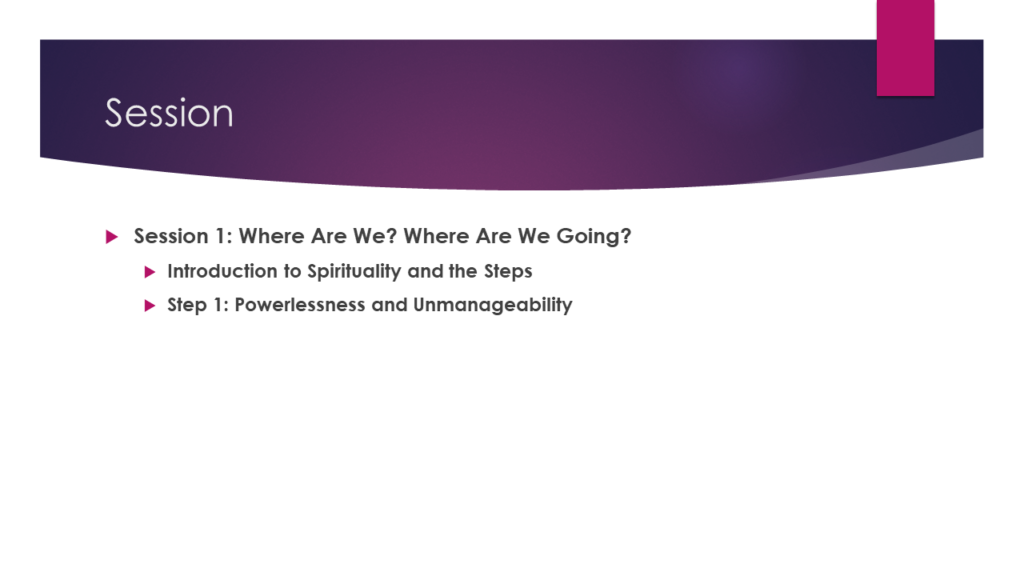
In this segment, we’ll be looking at some of the nagging problems that afflict us all, and show how the first step can initiate the process of spiritual recovery.
Here’s a story. When we bought our house in Palm Springs, it hadn’t been updated in many years. On the west side, a previous owner had added on a walk-in closet that opened off the bedroom, and next to it, a small, unfinished room that opened out to the side yard. We were told that the former owners raised German Shepherds and they used that room to bring the dogs in out of the heat. Before we moved in, we asked our contractor to join those two spaces (the walk-in closet and the dog room) into one large master closet. However, when the contractor started the renovations, they found that the dog room was a do-it-yourself project and wasn’t salvageable. Before they could build onto that side of the house, they found that they had to demolish both the dog room and the walk-in closet.
I think you’ll find that, in order to rebuild your spirituality from the ground up, just like our contractor, you’re going to have to start with some demolition. Old attitudes have to go in order to make room for new ones. How much demolition will be necessary will depend on how much of the spiritual disease is present in your own life. We can tell how successful our attempts to manage our own lives have been by how happy, joyous, and free we feel. If living feels like drudgery, if life is a struggle, and we feel lonely, isolated, and overwhelmed, perhaps we should look at what beliefs we hold about ourselves and our world that may need some demolition. We can start the process by examining how well we’re managing our relationships with God and the Universe, and with others, and how successful we are in creating our best lives.
Here’s how we’ll proceed:
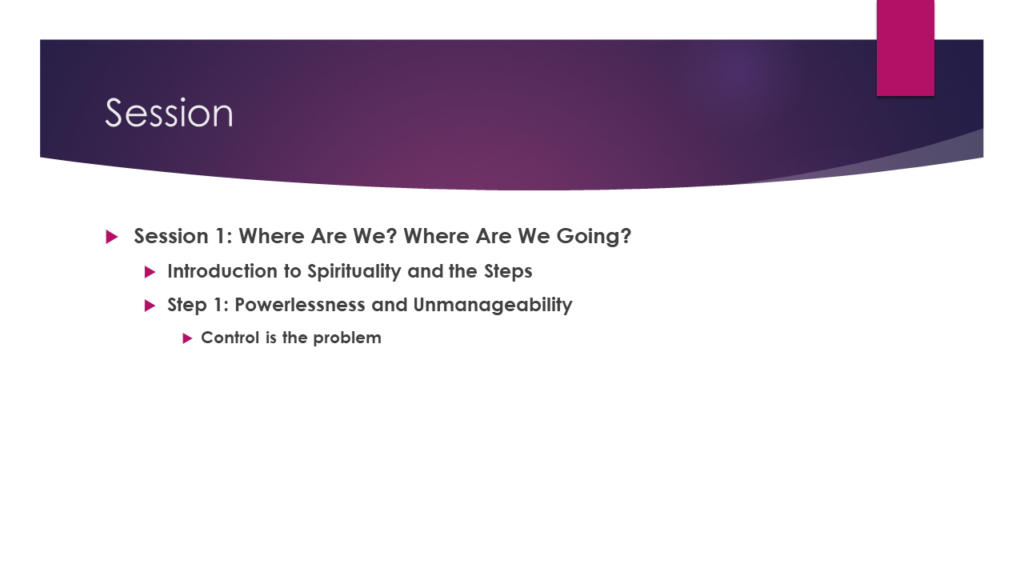
First, we’ll consider how control of our lives and our destinies is the problem.
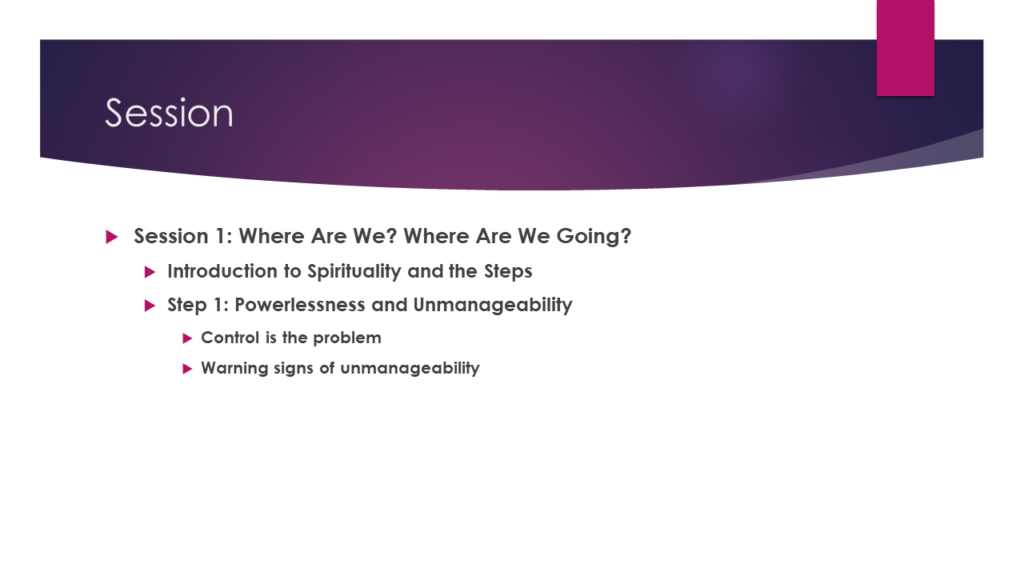
Then, we’ll see if any areas of life are out of control by looking at some of the warning signs.
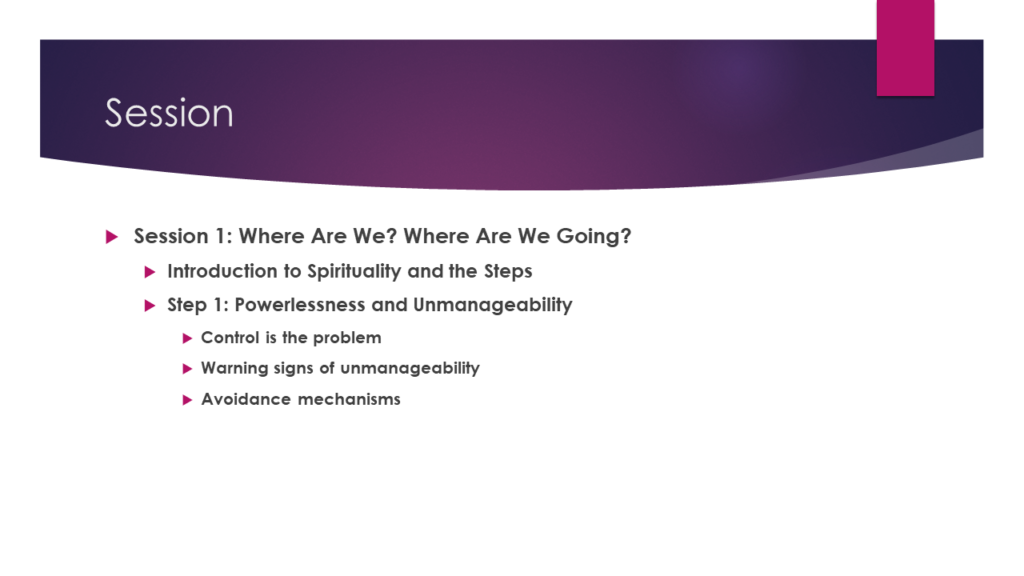
Then, we’ll look at some of the mechanisms we use to avoid dealing with unmanageability.
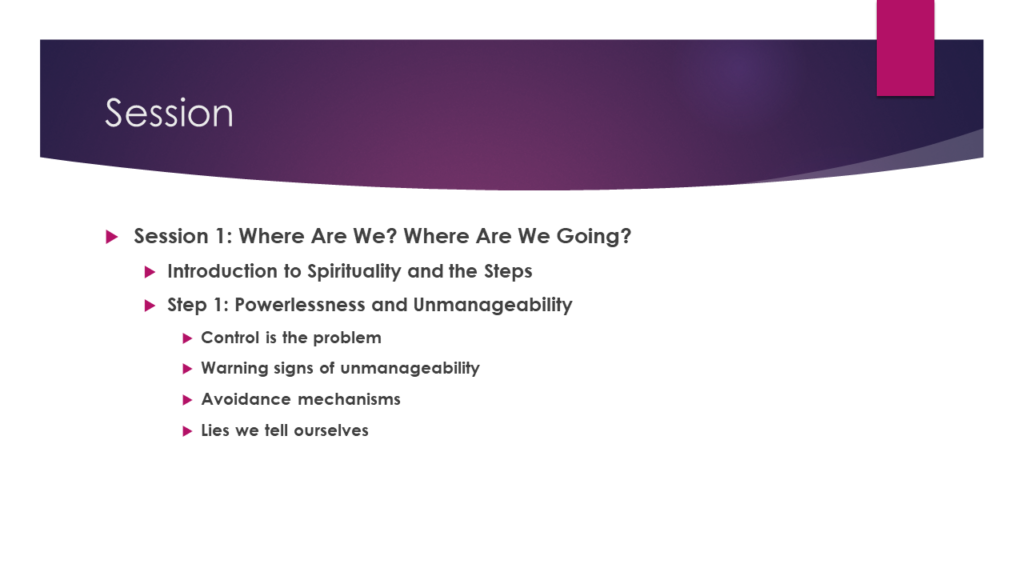
Finally, we’ll look at some lies we tell ourselves to justify our resistance to change.
Now, let’s have a look at the first of the twelve steps of our program of spiritual rebuilding.
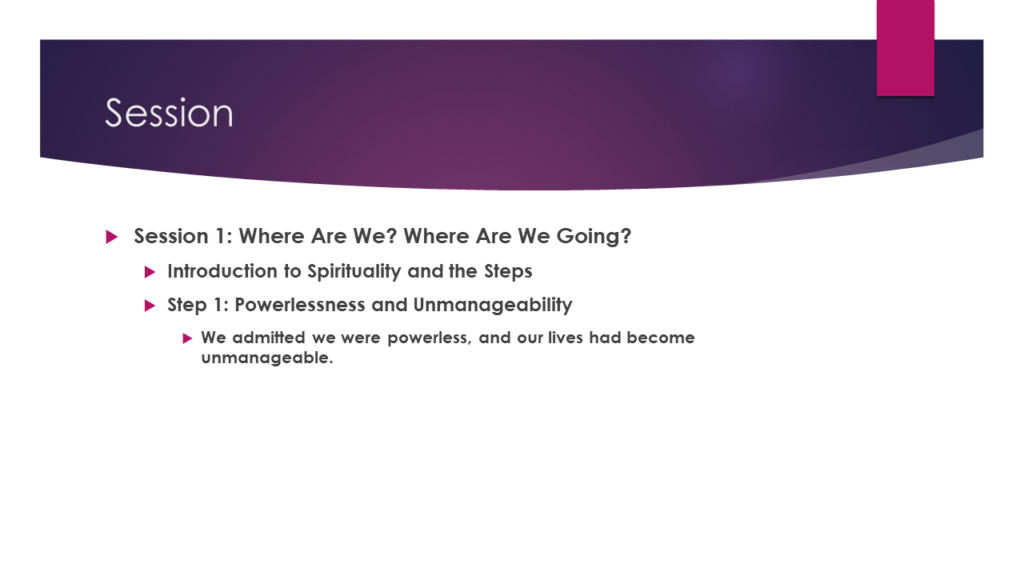
This step tells us that we recognize that our lives are unmanageable, and we are powerless to change that. On one hand, it seems easy simply to make this simple admission. But how can we honestly admit that we’re powerless? And isn’t it rather extreme to say that our lives are unmanageable? Let’s see.
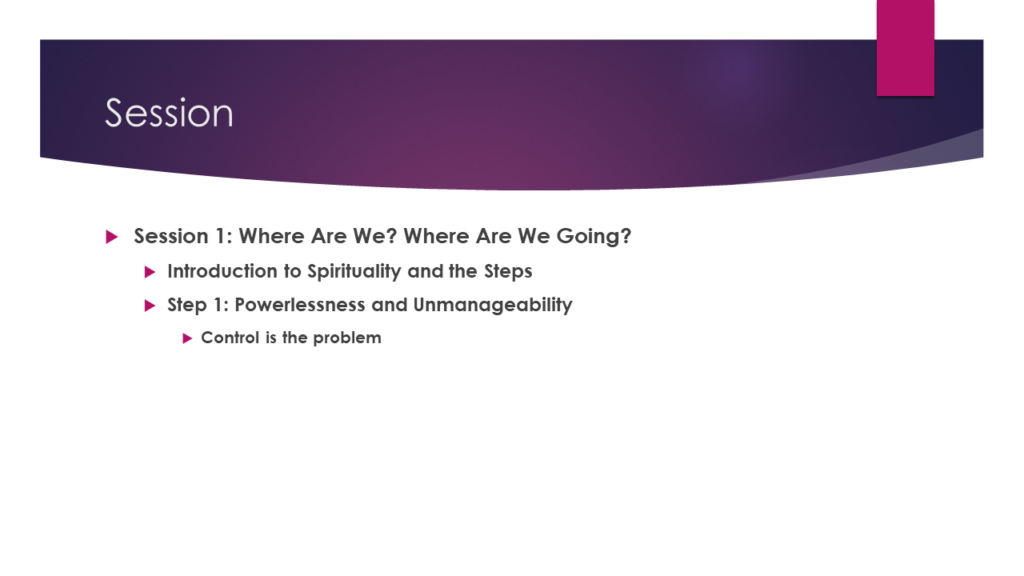
One of the effects of the spiritual disease is the illusion of control. Even if we believe in God, we’re still convinced that running our own lives is our responsibility. When we feel threatened, we find it necessary to exercise ever greater power over other people, places, and things. We feel the need to try to make people behave according to our beliefs, values, and plans. When people, places, and things aren’t to our liking, we have that need to change them—by force if necessary. Life then becomes a struggle to create a world in which we feel safe and accepted. When our attempts at control are unsuccessful, we panic. We can redouble our efforts, but the results most often are not to our liking.
Here’s another story. In mid-July 1999, John F. Kennedy, Junior and his passengers were supposed to fly from Essex County New Jersey to Martha’s Vineyard and then on to Hyannis Port, Massachusetts. John was flying a high-powered, single-engine Piper Saratoga. He had a visual flight rules license, which means that he was not highly trained in flying by instruments and was prohibited from flying in low visibility conditions. The group got a late start and they wound up flying at night, which should not have been an issue in good weather. But on their way over the open ocean, the visibility dropped significantly. Pilots—especially new, young pilots—sometimes overestimate their capabilities. John underestimated how disorienting it is to fly in instrument conditions. It’s often impossible in an airplane to sense your special orientation without visual cues. You can’t feel which way is up. John got disoriented. He struggled to maintain control. By doing so, he lost control and flew the plane straight down into the sea. Aerospace engineers estimated that when the plane hit the water it was going at three times its maximum design speed.
Most people don’t know that, if John had only let go of the controls, the plane would most likely have righted itself and regained straight and level flight. What caused that tragedy was his inexperience, his overestimating his capabilities, and his failure to relinquish control. Now, imagine that your life is like that airplane. Although your life may not be entirely out of control in a disastrous tailspin, chances are that some areas are.
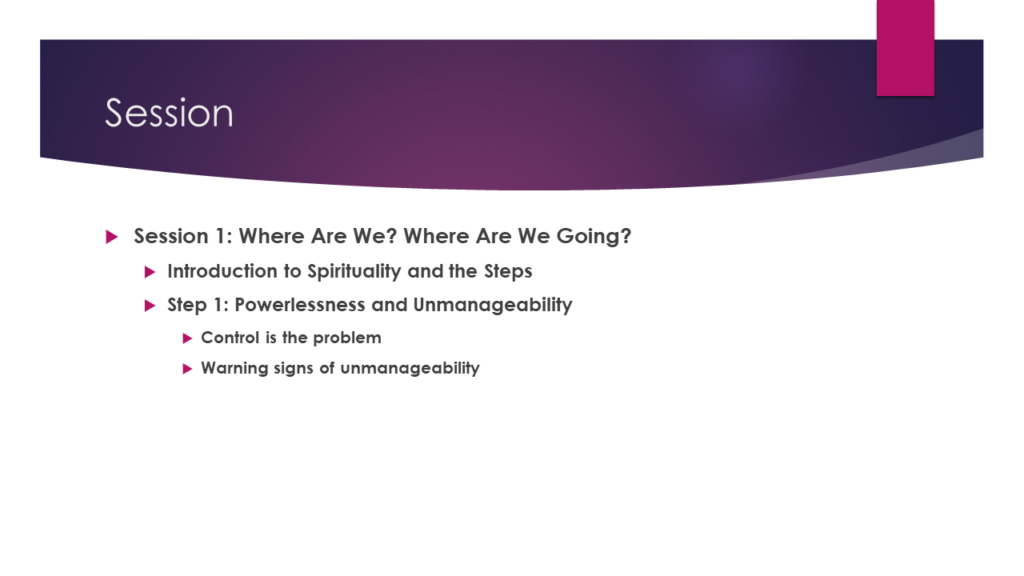
If we want to gauge the unmanageability of our lives, all we need to do is to examine our failures. We might define failure as the inability to make a desired change in our lives, in our relationships with others, or in our world. Here are some of the warning signs of unmanageability. I suggest you write these six factors down and take a few quiet moments later to see where they crop up in your current experience.
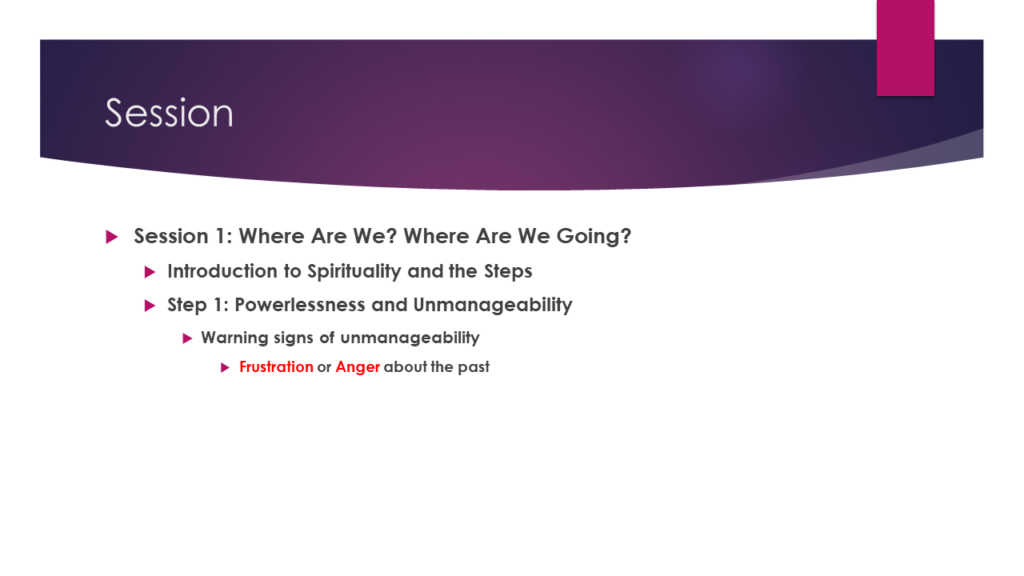
Out of past failures comes frustration that the outcomes of our efforts are not as we had desired. What are you frustrated about? Often, frustration turns to anger that something or someone has interfered with our plans. When were you last angry? What caused it?
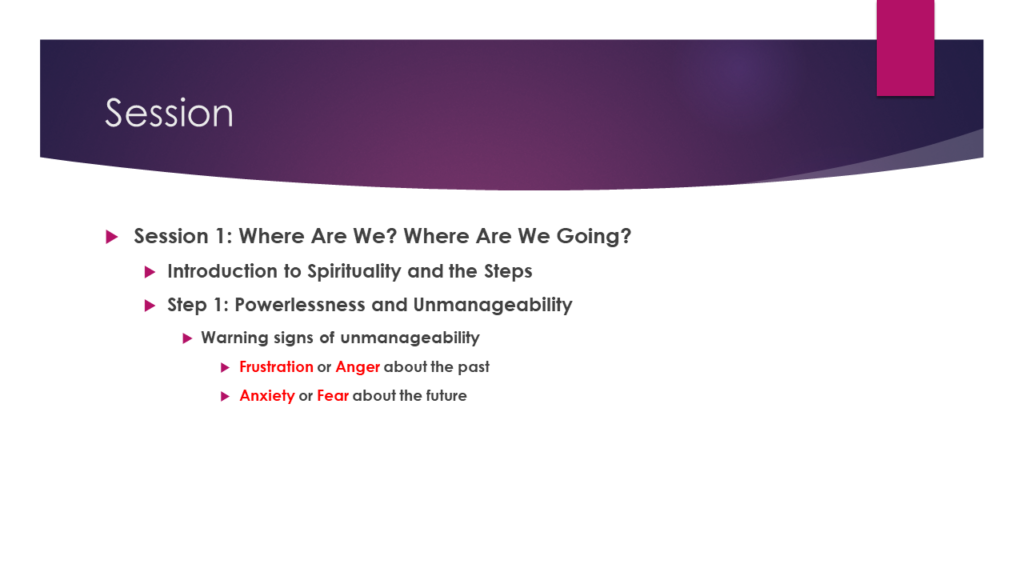
As we look toward the future and based on past experiences, we may anticipate with anxiety the struggles that await us in achieving our goals. When you’re anxious, what are you worried about? Fear generally arises out of concern about the consequences of not making a deadline and not getting what we want. What are you afraid of right now?
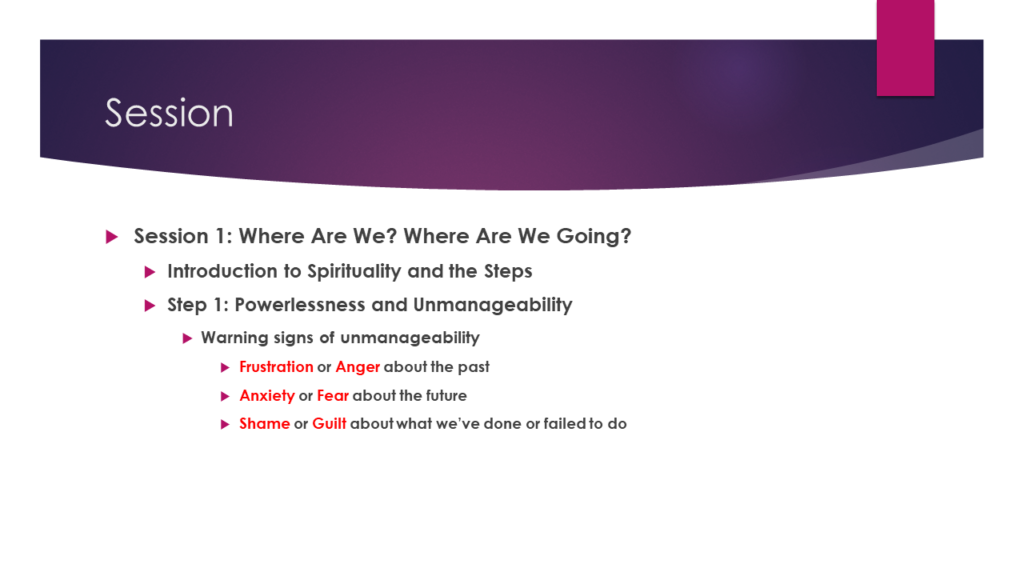
Shame is the feeling that comes from the belief that we are inadequate. When our plans are unsuccessful, we may feel shame that we weren’t up to the task. Guilt is the feeling that we did the wrong thing or didn’t do the right thing. Guilt comes from the belief that our wrong choices (deliberate or not) caused us to fail to reach our goals, and therefore to suffer the consequences.
This is how we take stock of the unmanageability of our lives. See if you can identify any areas of your life where you feel as though you’ve been beating your head against a wall. What have you been trying to accomplish? Why is it important to you? How have you been trying to accomplish it? What has gotten in your way? Was it something or someone outside of yourself, or was it your own fault? Are you still working at it, or have you given up?
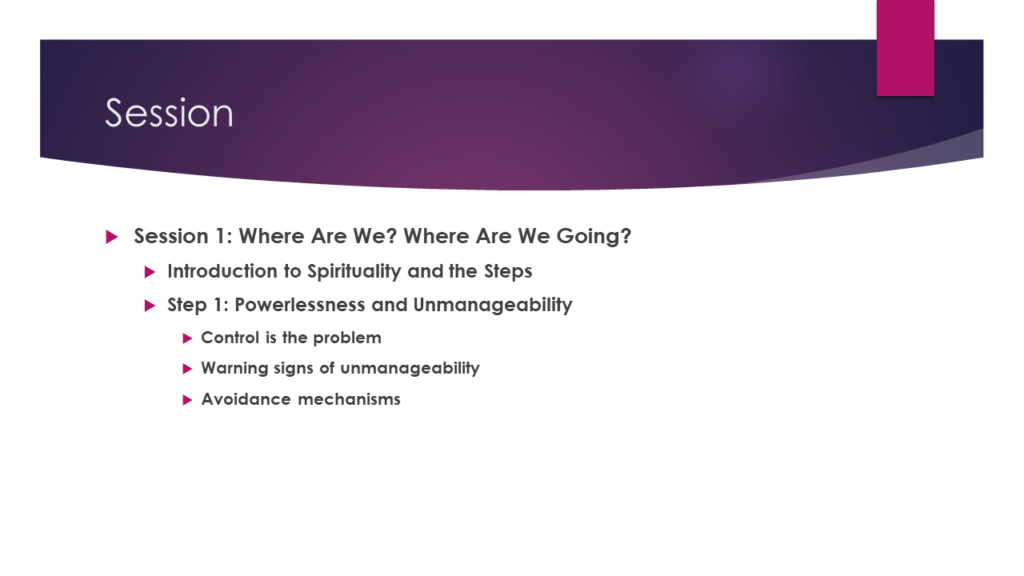
There are several unhealthy avoidance mechanisms that can get in the way of our examination of the unmanageability of our lives. These attitudes support and enhance our spiritual illness and need to be discovered and rooted out.
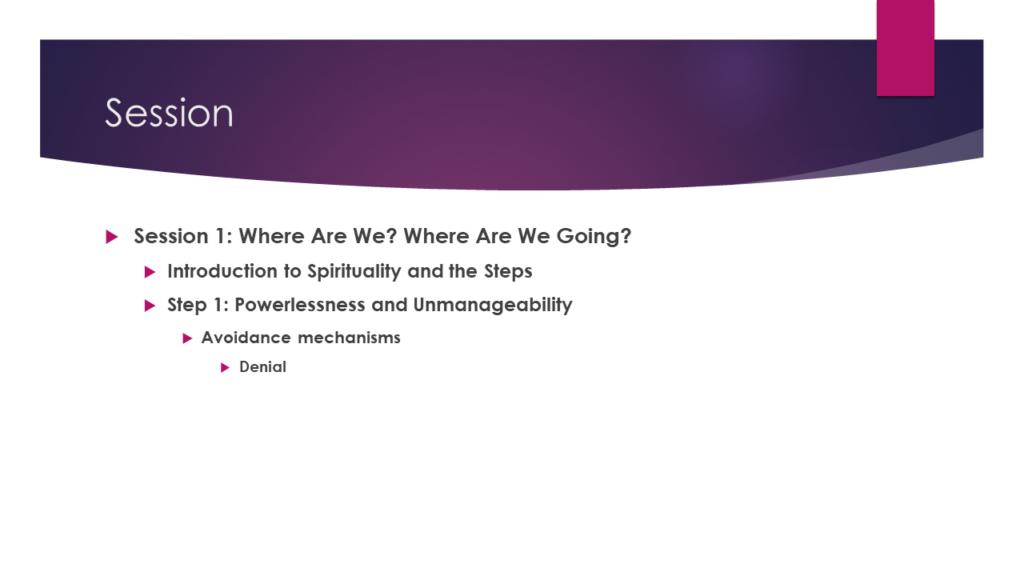
The first, and most insidious and dangerous, is denial. Denial looks at failure and refuses to acknowledge it at all. Denial says, “There’s no problem. There’s nothing wrong. I’m not in pain. Everything’s fine.” Denial is particularly insidious because it not only lies to others, but it also lies to itself. There can be no solution if there’s no problem.
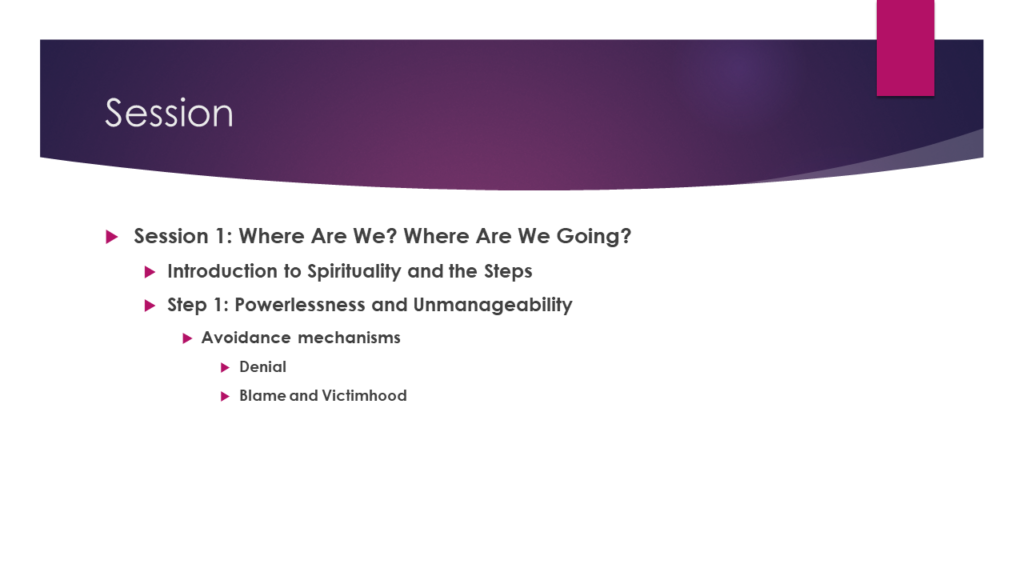
The second unhealthy attitude is blame. Blame acknowledges the problem but refuses accountability. It’s always looking for an exterior cause for its troubles. When failure occurs, blame looks for a reason, not to learn from it and to apply corrective action to it in the future, but to avoid taking responsibility. It’s a very short step from “It’s not my fault” to “This always happens to me.” The flip side of blame is victimhood. Victimhood is a passive and fatalistic attitude that not only denies responsibility, but pushes responsibility off onto others, the Universe, or God. The victim says, “It’s my fate to be a failure.”
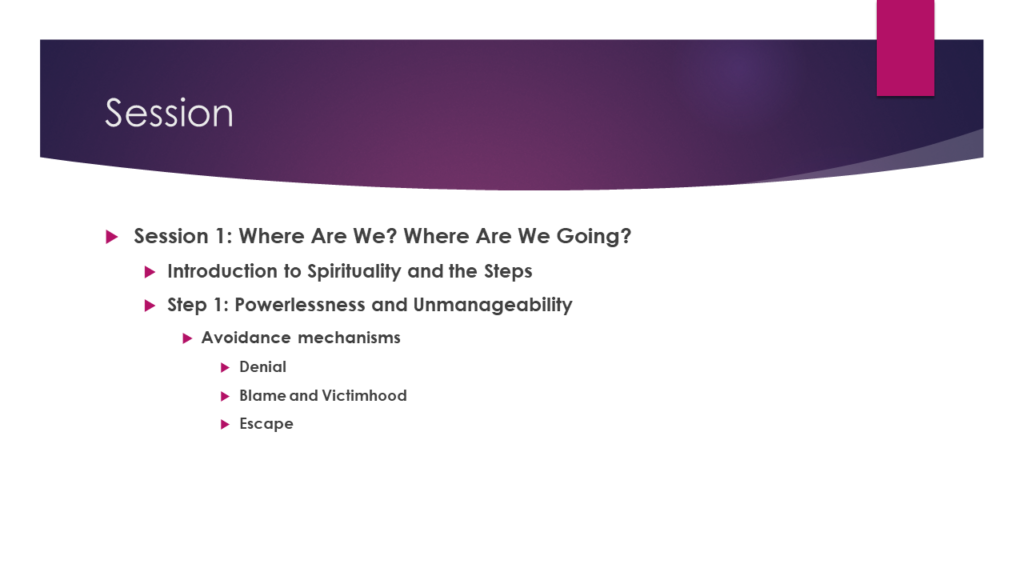
By far, the most pervasive unhealthy attitude is escape. Escape is first-cousin to denial. Where denial says there is no problem, escape runs away from it. It puts problems on the shelf for the time being, saying, “I’ll get back to those later.” But mañana never comes. We’ve all discovered sooner or later that beyond any form of escape we may choose, there’s always another one. Escape becomes habit, and a habit can become an addiction. Anything we can use to numb our feelings of shame or guilt can become an addiction. What’s your escape habit? Just ask yourself, “Where do I most often go and what do I most often do when life seems too much?”
Now that we’ve examined the ways our lives resist our best efforts to control them, and the various attitudes that we use to excuse ourselves from acknowledging failure, are we ready yet to admit that, in many ways, our lives have become unmanageable? Don’t we sometimes feel that our best efforts are expended rearranging the deck chairs on the Titanic? Are we making any progress at all in creating what’s most important: namely, forming meaningful relationships with God and our world, with others, and with our own destinies?
Our lives may not be a total mess. However, there’s no one whose life is mess-free. Everybody messes up at some time or another. The only question is how bad’s the mess? For most people, there are some messes that are recalcitrant. They’re resistant to our best efforts to clean them up and keep them from recurring. Even when we’re deep into our avoidance techniques, in our more lucid moments, we know the problems are there. Like our ill-fated pilot, they don’t respond to our attempts to control them. We hate to admit that there are problems in life that we can’t solve, yet admitting to them is the only route to solving them. We’re not up to the task. We lack the physical, mental, emotional, and spiritual strength to overcome our problems. If we want to be healed of the spiritual disease that afflicts us, we must start by admitting we lack the power to control our own lives. It’s a tough admission, but it’s essential.
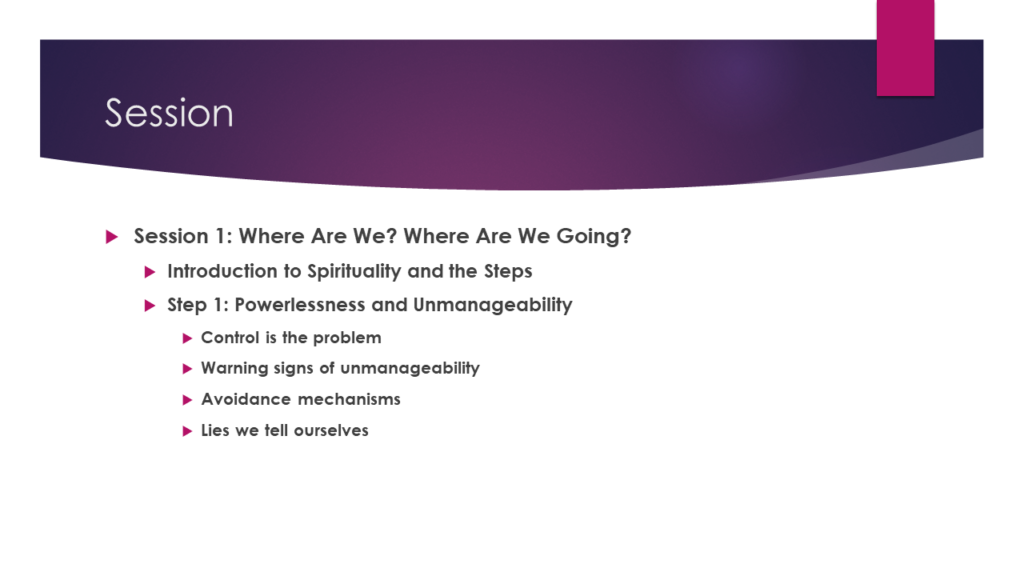
Before we conclude, there are two more attitudes that can short-circuit spiritual growth from the outset. They are the lies we tell to others but, more importantly, the lies we tell ourselves. If we believe them, they’ll stand in the way of our spiritual growth.
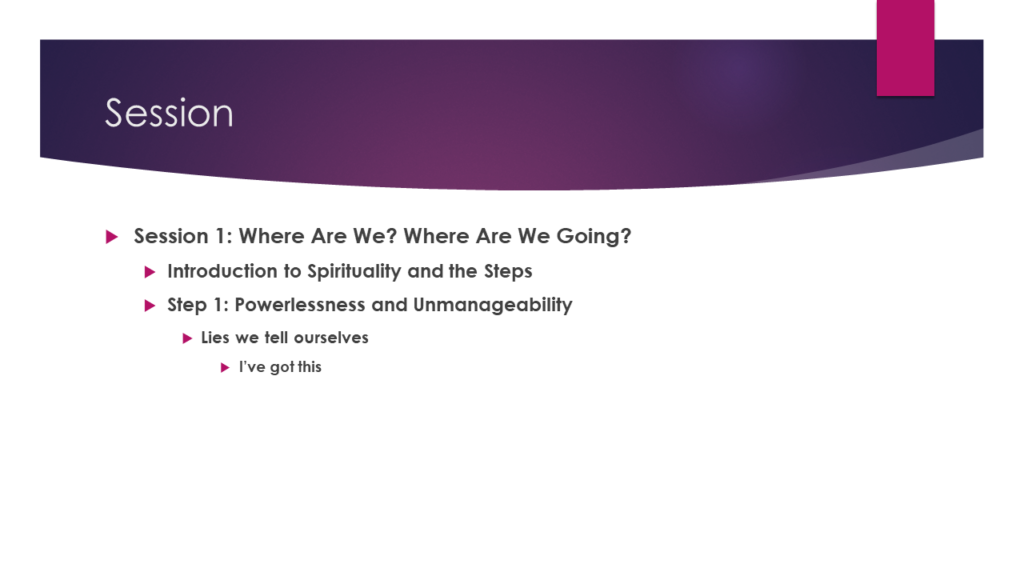
The first one looks at a situation and says with total confidence, “I’ve got this.” That pretends that, by our own power, we can determine the outcome of our efforts with complete certainty. The reality is entirely the opposite. We have no control whatsoever over the results of our efforts. There’s a possibility of success, there may even be a probability. However, there will never be a certainty. What is certain is that we don’t got this. We are powerless to change persons, places, or things with any certainty at all.
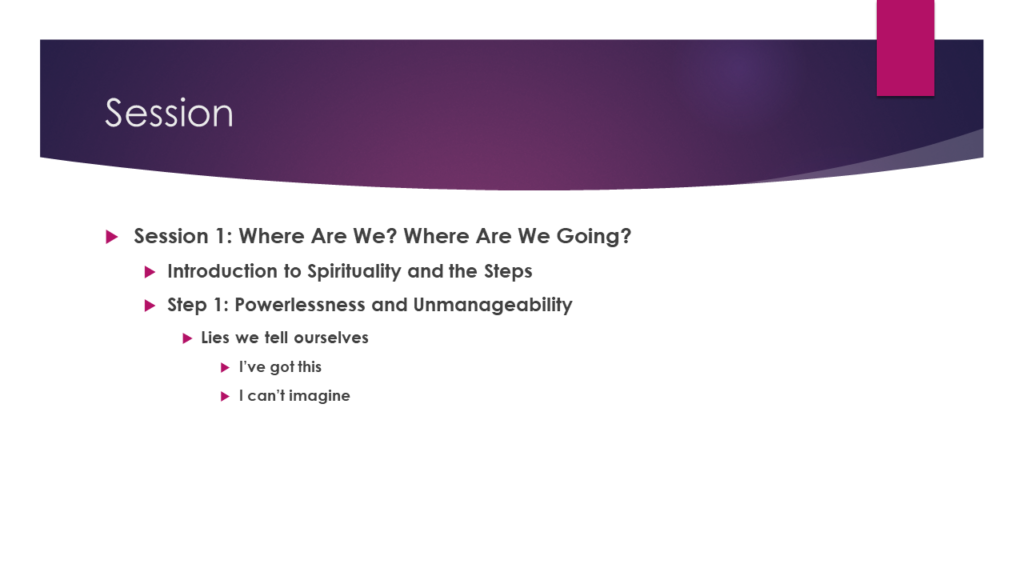
The second attitude is equally dangerous. It looks at the way forward and says, “I can’t imagine that the rules apply to me.” Lest we forget, spiritual principles are universal. There are no exceptions. Nobody is a special, unique case to whom the rules don’t apply. Just as John Kennedy thought that visual flight rules didn’t apply to him, so everyone whose life has crashed and burned has imagined her- or himself an exception to the rules. It derives from the same delusion of ultimate control. Still, there is only one way forward, and there is no one to whom the rules don’t apply. We’re all in the same boat.
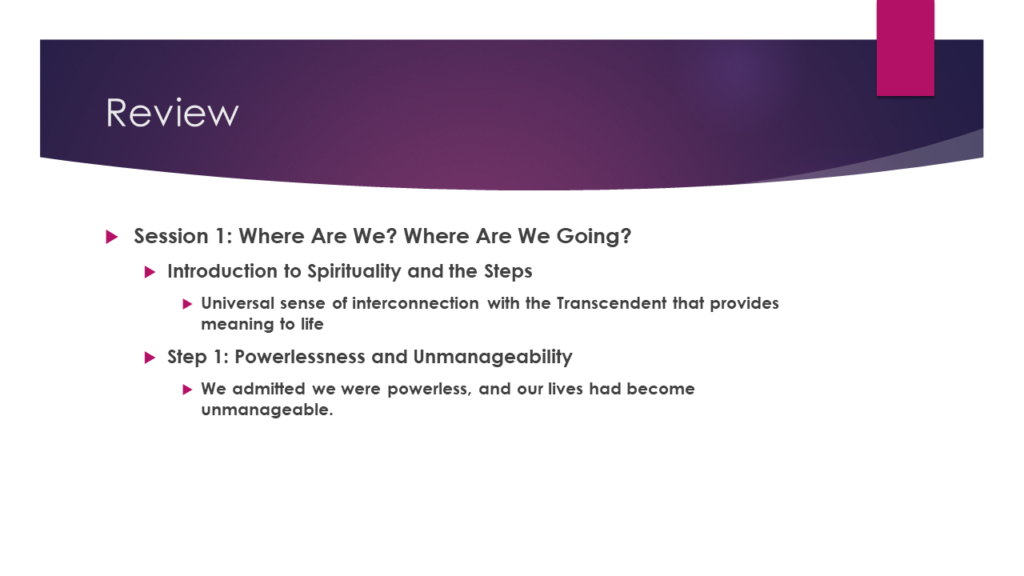
Here’s a quick review of the first session. We saw that spirituality is a universal sense of interconnection with the Transcendent—that is, God and the Universe, others, and our own destinies—that provides meaning to life. To achieve spiritual growth, we must first tear down our old ideas, particularly the idea that we’re in control. We must arrive at the absolute conviction that we are powerless before the Transcendent. There is nothing outside of ourselves that we have ultimate control over. Let that sink in. That’s the first step.
